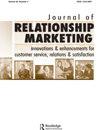感知转换成本在关系营销实践与客户忠诚之间的中介作用:来自银行的证据
Q2 Business, Management and Accounting
引用次数: 0
摘要
【摘要】关系营销与感知转换成本一起被视为一种杰出的客户忠诚度战略方法。关系营销实践使企业能够理解和满足客户的需求,而感知到的转换成本提高了竞争对手抓住易受骗客户的门槛,并有助于企业确保低满意度客户的忠诚度。鉴于此,本研究旨在探讨关系营销实践在感知转换成本的中介作用下对顾客忠诚的影响。本研究采用单阶段整群抽样的方法,从银行客户中收集736份完整的问卷,通过偏最小二乘结构方程模型(PLS-SEM)对计量模型和结构模型进行验证。结果发现,关系营销实践对顾客忠诚有显著的正向影响。感知转换成本对顾客忠诚有显著的正向影响。自举法的中介分析表明,感知转换成本在关系营销实践与顾客忠诚之间具有部分中介作用。本研究建议银行应加大在关系营销实践上的投入,以增强客户的感知转换成本,从而保持客户对组织的忠诚度。关键词:关系营销保留营销策略关系纽带感知转换成本客户忠诚度确认tawseef Ahmad Ganaie是印度社会科学研究理事会博士奖学金获得者。这篇文章很大程度上是由ICSSR赞助的博士工作的结果。披露声明作者未报告潜在的利益冲突本文章由计算机程序翻译,如有差异,请以英文原文为准。
Mediating Role of Perceived Switching Costs between Relationship Marketing Practices and Customer Loyalty: Evidence from Banks
AbstractRelationship marketing together with perceived switching costs are seen as a distinguished strategic approach to customer loyalty. Relationship marketing practices enable the firms to comprehend and satisfy the customer needs, while the perceived switching costs raise the bar for rivals to grab the gullible customers and helps the firms to ensure the loyalty of low satisfied customers. In view of this, present study aims to investigate the impact of relationship marketing practices on customer loyalty with a mediating role of perceived switching costs. The study utilized 736 complete questionnaires collected from the bank customers, by using one-stage cluster sampling, to validate the measurement and structural models through partial least-square structural equation modeling (PLS-SEM). Results revealed that there is significant positive effect of relationship marketing practices on customer loyalty. Furthermore, perceived switching costs have significant positive effect on customer loyalty. Bootstrapping approach to mediation analysis revealed that perceived switching costs, in unison, partially mediate the relationship between relationship marketing practices and customer loyalty. The study suggests that banks should invest more in relationship marketing practices to strengthen the perceived switching costs to keep the customers loyal to the organization.Keywords: Relationship marketingretention marketing strategiesrelational bondsperceived switching costscustomer loyalty AcknowledgementTawseef Ahmad Ganaie is a recipient of Indian Council of Social Science Research Doctoral Fellowship. This article is largely an outcome of the doctoral work sponsored by ICSSR.Disclosure statementNo potential conflict of interest was reported by the author(s)
求助全文
通过发布文献求助,成功后即可免费获取论文全文。
去求助
来源期刊

Journal of Relationship Marketing
Business, Management and Accounting-Marketing
CiteScore
10.20
自引率
0.00%
发文量
7
期刊介绍:
The Journal of Relationship Marketing is a quarterly journal that publishes peer-reviewed (double-blind) conceptual and empirical papers of original works that make serious contributions to the understanding and advancement of relationship and marketing theory, research, and practice. This academic journal is interdisciplinary and international in nature. Topics of interest (not limited to): Evolution and life cycle of RM; theoretical and methodological issues in RM; types of RM, networks and strategic alliances; internal communication, quality, trust, commitment, satisfaction, loyalty, and dissolution in RM; applications of RM in different disciplines and industries; international perspectives in RM; RM strategies in services economy, higher education, and e-commerce; RM, technology, and the Web; profitability and RM; case studies and best practices in RM. If you are interested in becoming an ad-hoc reviewer, please e-mail a brief statement indicating your area of expertise and interest along with a copy of your CV.
 求助内容:
求助内容: 应助结果提醒方式:
应助结果提醒方式:


